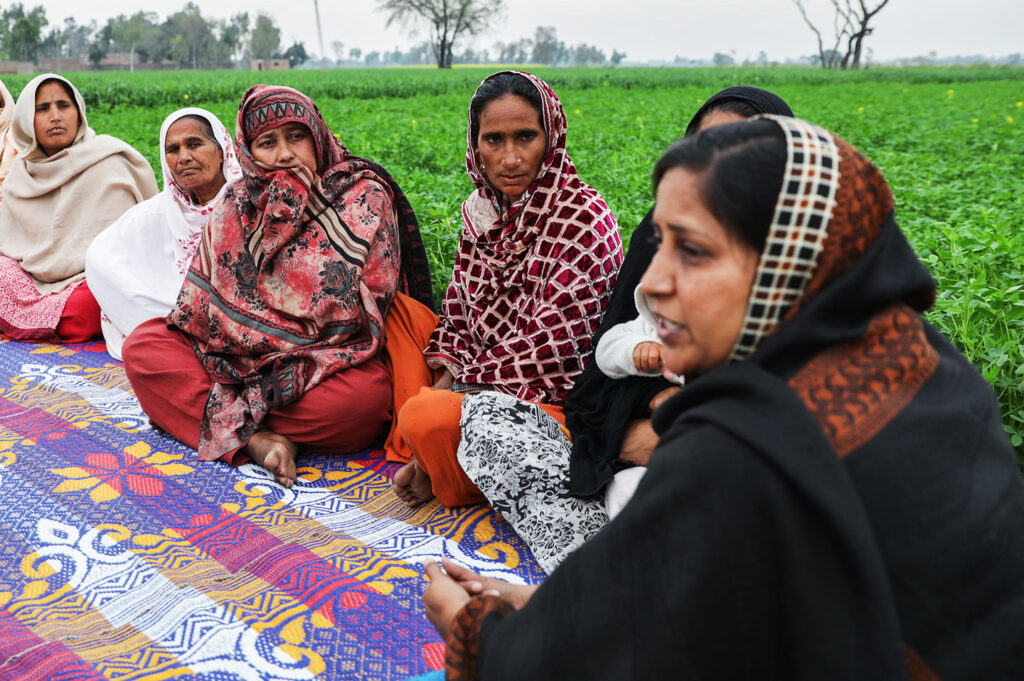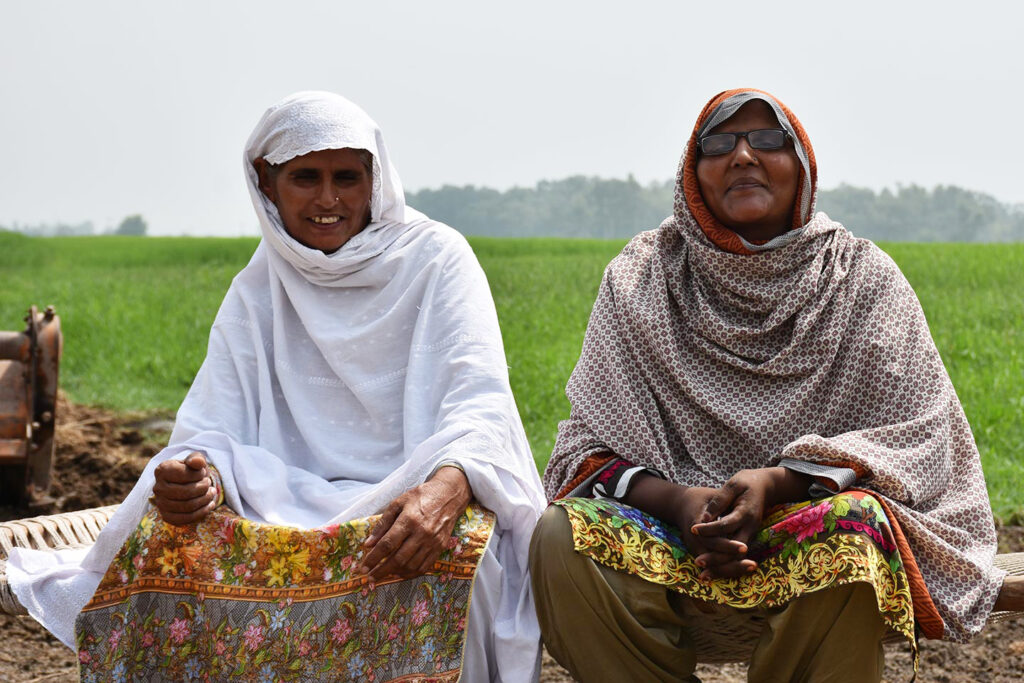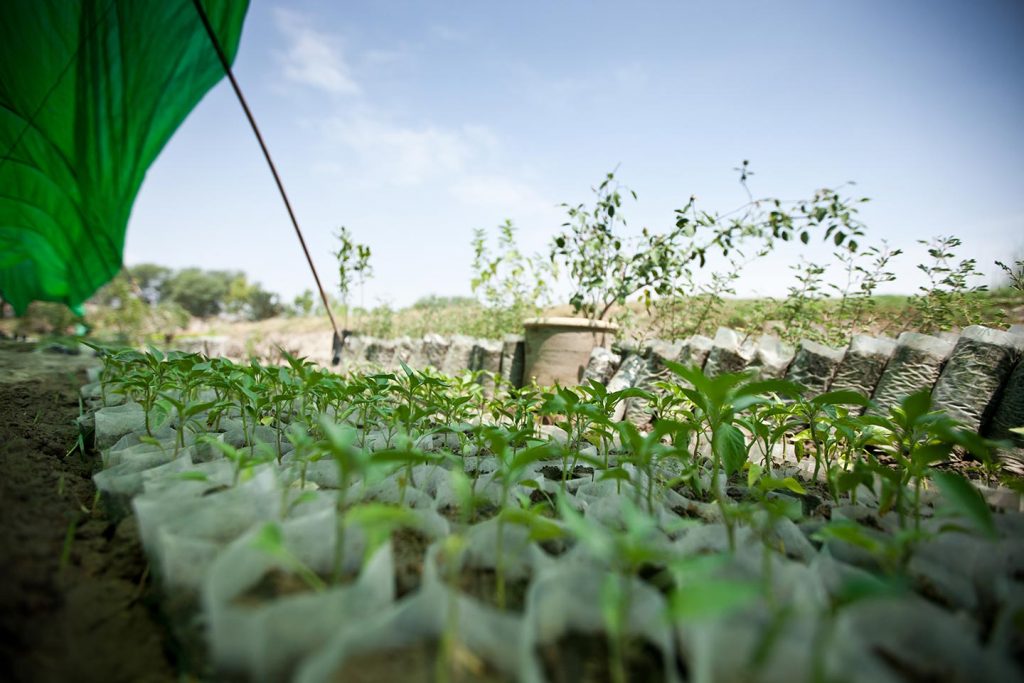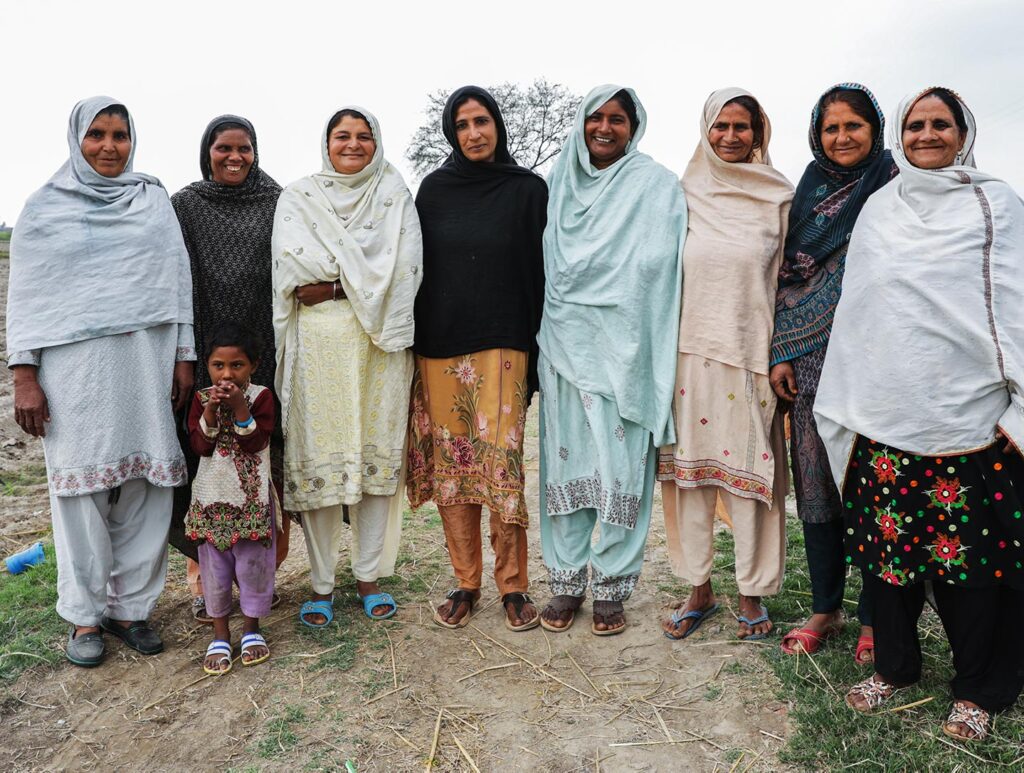“Together we can make a real difference”
2020.01.30
Axfoundation is expanding the project for sustainable production of basmati rice from 900 to 2,500 farmers and workers, 50% are women. The second phase will run for three years and started late in the summer of 2019. Ten grower organizations were created during the first phase in the Sheikhpura district in Pakistan. Now, another 15 grower organizations have been formed, with ten in the Gujranwala district. Almost 17,000 people are indirectly affected by the project if one includes family members effected by higher income.
Today, the 2,250 farmers and rice workers who are involved in the grower organizations are better placed to negotiate the price by jointly being educated in sustainable production according to SRP, the Sustainable Rice Platform standard.

Women rice growers from Muridke, the Punjab, have gathered to learn more about their rights and sustainable rice production. 2,250 small-scale rice farmers have so far organized themselves into 25 grower organizations. 50 % of the leadership positions are held by women. (Photo: Insiya Syed)
Axfoundation has since 2015, in collaboration with Axfood and other actors in the supply chain of Garant basmatiris, invested in strengthened social and environmental conditions in the production of basmati rice from Pakistan. The project is an example of how business can make a real difference and take responsibility for sustainability throughout the production chain.
Oxfam is implementing the project together with their partner in Pakistan, with the main task of providing technical support and training to small-scale farmers. The aim is to increase the farmers’ productivity, strengthen climate change resilience and improve rice quality. Women farmers and workers play an important part in the project both as decision makers and growers. Reducing middlemen and creating stronger links to mills in Pakistan are important aspects, another is to decrease the gap between the grower’s real salary and a living wage.
“One individual actor can’t change the situation for rice growers in Pakistan singlehandedly. But together we can make a real difference. We’re therefore gathering the whole supply chain in this project to address the different challenges facing the rice farmers.” – Viveka Risberg, Program Director Sustainable Production and Consumption, Axfoundation
Great risks in the supply chain
Rice production requires large quantities of water and has severe impact on the environment and the climate. Conversely, climate change is posing significant challenges to rice production with unpredictable weather patterns and diminishing groundwater levels. In addition, working conditions are harsh in Pakistan with women being especially exposed. Through the project the farmers’ capacity is strengthened which in turn leads to higher yields and better rice quality, while decreasing water and chemical usage, and lowering CO2 emissions from rice production. The project’s focus on equality strengthens the women’s position, which has been well received by male farmers and workers. Increased knowledge of production techniques and awareness of safe working conditions is building the capacity in the region long-term.
“We want Garant basmatiris to be grown, harvested and sold in a manner that benefits both the small-scale farmer and the environment. We have therefore invited the whole production chain into the project. Everybody has the same goal; sustainable rice.” – Kristina Areskog Bjurling, Sustainability Manager, Axfood/Dagab
The project is a Private Public Partnership and a part of Oxfam’s project GRAISEA, Gender Transformative and Responsible Agribusiness Investments in South East Asia, financed by SIDA. The aim is to develop sustainable production methods, strengthen women’s influence and improve working conditions, thus improving the rice quality and farmers’ income.
Small-scale farmers are organizing
The training is carried out through the method train-the-trainer which means that Oxfam educates trainers chosen by the grower organizations who will then pass on what they’ve learnt to the members. Farming techniques, working conditions, quality and pricing aspects are part of the training. The forming of grower organizations has led to a substantial increase in participation and shared responsibility. It has created measurable positive effects on the environment, for the rice growers’ working conditions and increased their incomes. One of the participants is Hameeda Bibi from Khatiaa Tehsil Muridke in the Punjab.
“You can go and look at my field. It is better than any man’s field. We have learnt the best production techniques through the project’s training. We have today not only bigger yields, but we can also store the rice and prevent waste. We have formed grower organizations together with others in all the ten villages in our area, after we had been to all the meetings and training they had organised. Now we can teach others in the same way. It’s knowledge that’s behind our success.” – Hameeda Bibi, the Punjab

Hameeda Bibi and Kausar Bibi spread the skills of sustainable farming to more women in the area (Photo: Shirin Abbasy)
0
farmers and workers have so far been trained in sustainable rice production
0
grower organizations have been formed with 2,250 farmers and workers
0
% of leading positions are held by women
Sustainability certification for rice and increased income
The Sustainable Rice Platform (SRP) is a sustainability certification for rice. The standard includes social and environmental criteria which have formed the base for important guidelines in the project. If more buying companies demanded SRP cultivated rice, then more small-scale farmers would cultivate sustainably and get paid better.

The 177 farmers who sold their rice to Matco Food, one of the rice exporters that is collaborating with the project, were on average paid 1600 rupees/40 kg rice, which is 100 rupees over the market price.
50 % of the leadership positions are held by women
Rice is one of Pakistan’s most important export crops. Women have traditionally “helped out” in the fields with salaries far below the men’s. The fact that women play such an important role in rice production has proved to be a success factor both for themselves and for other members of their families.
Kausar Bibi lives in the village Khatiala Tehsil Muridke and heads the village’s grower organization and is the boss of both male and female seasonal workers.

Strength in numbers. Some of the female leaders of the grower organization in the Punjab are gathered (Photo: Insiya Syed)
“The strength is in the numbers. Us women have always worked in the rice fields, but before we didn’t get the right pay for our work. We always worked hard in spite of tough working conditions and didn’t think about our health. If we didn’t get our salaries, we couldn’t do anything about it. But now we’ve learnt that we’re strong together and can demand our rights. No one listened to us when we made demands in small groups. This time we formed a large group and our demands were met – we got better salaries! Before we would get 2,000-3,000 rupees but this time we got 5,000 rupees. Before us women were not involved in the decision making. Women used to follow the decisions made by male family members.” – Kausar Bibi, the Punjab
0
% decreased water usage in the rice production
0
% less CO2 emissions from rice production
0
% increased productivity
Gearing up during 2020
The model with Sustainable Rice Production (SRP) training has proved to work. However, the current farming method still used by many small-scale farmers in the region is problematic with slash-and-burn farming, and ineffective usage of water and chemicals. In addition, the gap between the real income and a living wage for rice growers is generally big. Therefore, the focus going forward in the project lies on spreading the project model to more market stakeholders, both buyers in Europe and exporters in Pakistan, so that sustainable rice production becomes the norm. If the whole trade requests SRP certified rice, the rice sector will become more sustainable and the farmers will get a living wage.
“We want to spread the knowledge about the Sustainable Rice Platform in the Swedish market so that more actors request sustainably produced rice.” – Viveka Risberg, Program Director Sustainable Production and Consumption, Axfoundation
Private Public Partnership enables long-term financing
Oxfam operates the GRAISEA-project in several countries in Southeast Asia together with the retailers, suppliers, exporters, small-scale farmers and local organizations. The aim is to improve the provision for small-scale producers within the farming sector in Asia through inclusive value chains and responsible business methods. SIDA is the main funding agency. Co-funders and partners in the Sustainable Rice Production in Pakistan project are Axfoundation, the rice supplier RolRyz and the Norwegian wholesaler Unil. Several actors are also actively involved in Pakistan; exporting companies (mills), the Rice Research Institute and the University of Agriculture in Faisalabad (Pakistan). Keeping a dialogue with local authorities and influencing legislation within the farming sector are parts of the project.







































